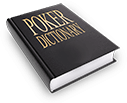Poker Strategy Tips and Tricks
Introduction
Poker is a popular skill-based card game that is played globally, and India is no exception. It is a game of skill, calculation, and lots of patience.
If you are looking for quick tips and tricks to master the poker game, then this article is for you. We have compiled 10 strategies to make you a confident poker player.
Objective
The blog aims to give helpful tips to improve your poker skills and understanding.
It aims to help players improve strategic thinking and decision-making in poker. This enhances overall performance in various poker games.
What is Poker Strategy?
Poker strategies are the choices and moves players use to boost their odds of winning. It's essential to learn the correct strategy, understand opponents, analyse the situation, and stay calm.
Poker strategies are important. Therefore, tried and tested poker tips and tricks are important to learn.
Top Tips For Effective Poker Strategy
Play fewer hands and play them aggressively
It's crucial to be selective with the hands you play. Focus on those with higher winning potential. By playing with fewer hands, you minimise the risk of losing the chip stack.
ImproveShow HardPlaying only the best hands make your hands stronger.
When you play, be confident and raise bets to pressure opponents and win more.
Don't be the first player to limp
Limping, or just calling the big blind, can signal weakness to your opponents.
Avoid limping as it gives up control of the pot and allows others to dictate the action. Instead, consider raising or folding, which puts pressure on your opponents.
"Semi-Bluff" aggressively with your draws
ImproveShow HardWhen you semi-bluff, you bet or raise with a hand that could get better but isn't strong enough to win yet.
When you bet on draws like flushes or straights, you can win right away if others fold. You can also win a larger pot if you hit your draw.
Fast-play your strong hands to build the pot and make more money
When you have a strong hand, such as a top pair or better, don't slow-play it by checking or calling.
Bet and raise strongly to increase the pot and get the most out of your opponents. This increases the likelihood of winning a larger pot when you have the best hand.
Defend your big blind (with the right hands)
The big blind is a forced bet, and defending it with the right hands is essential. This will prevent opponents from stealing your blinds too frequently.
Choose strong hands that have good playability post-flop to defend your big blind effectively.
Fold when you're unsure
If you're unsure about the strength of your hand or the likelihood of winning the pot, it's better to fold and preserve your chips for better opportunities.
Folding allows you to avoid costly mistakes and maintains your stack for future hands.
Attack when your opponent shows weakness
Pay attention to your opponent's actions and look for signs of weakness, such as checking or hesitating.
Seize the opportunity to bluff or bet aggressively to capitalise on their vulnerability and potentially win the pot.
Play solid poker early in tournaments (Don't worry about survival)
In the early stages of a tournament, focus on playing solid and aggressive poker to accumulate chips and build a strong stack.
Don't play too passively or worry too much about survival; instead, aim to gain an early advantage over your opponents.
Only play if you feel like It
Poker requires mental focus and concentration. If you're not in the right mindset to make sound decisions, consider taking a break or sitting out until you feel mentally prepared to play your best game.
Only play in good games
Choose games where you have an edge, whether it's due to weaker opponents, favourable table conditions, or higher potential profits.
Avoid playing in games where you're at a disadvantage or the conditions are unfavourable.
Frequently Asked Question
What is the best poker strategy?
The best poker strategy involves playing tight, focusing on starting hands with strong value such as pocket pairs, big face cards, and suited aces.
Additionally, starting by playing only the strongest hands helps to maintain a lower VPIP (Voluntarily Put Money in Pot) poker statistic and avoid unnecessary risks.
Is poker a game of luck or skill?
Poker is primarily a game of skill, where expertise and strategy play significant roles in determining outcomes.
Luck does influence individual hands, but overall, skill dominates the game.
What is the most profitable poker strategy?
The most profitable poker strategy is a tight-aggressive (TAG) approach. This involves playing fewer hands but playing them aggressively when you do enter a pot.
By being selective with starting hands and making strong bets and raises, players can maximise their profits over the long term.
Conclusion
Mastering poker strategy requires a combination of practice, study, and patience. Dedicate time to playing poker regularly to improve your skills. Invest time in learning poker theory and strategies to understand the game better. Pay attention to your opponents' behaviours and adapt your strategy accordingly. Be mindful of your bankroll and avoid spending money you can't afford to lose. Practise patience and discipline, especially during losing streaks, to avoid making emotional decisions. And remember, consistency and dedication are key to mastering any craft, including poker.

